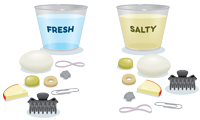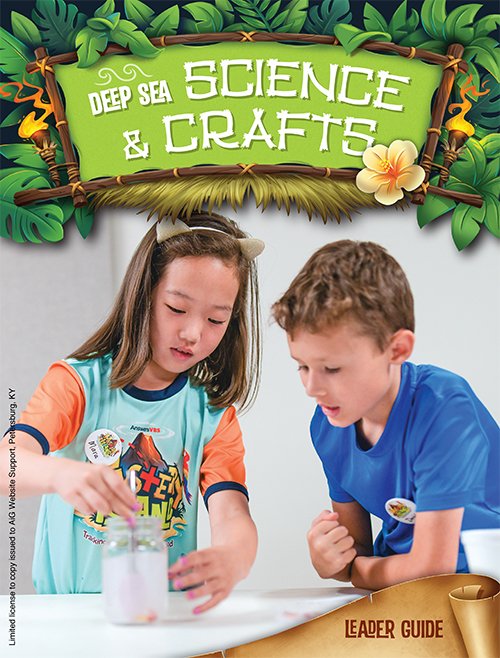Salty or Fresh?
Day Five Experiment
on November 22, 2021; last updated December 1, 2021Materials (for every group of 3–4 students)

- 2 9-oz. clear plastic tumbler cups
- Permanent marker
- 1 paper clip
- 1 toasted oat cereal piece
- 1 small piece of apple
- 1 grape
- 1 small rubber band
- 1 small plastic hair clip
- 1 hard-boiled egg
- 1 small rock
- 1 1/2 c. water
- 2 T. salt
- Salty or Fresh Guess Sheet
Pre-Prep
Write the word “salty” on half the cups and “fresh” on the other half with the permanent marker. To make saltwater, boil 3⁄4 c. water per group. Remove from heat and add 2 T. salt per group. Stir until salt is dissolved. Let it completely cool and then pour 3⁄4 c. saltwater into each saltwater cup. Pour 3⁄4 c. freshwater into each freshwater cup. Slice the apple into small pieces. To hard boil an egg, put the egg in a small saucepan, and fill the pot with cold water until the water is about an inch above the egg. Put a lid on the pot, and then cook over high heat until the water reaches a boil. Once the water boils, turn the heat down to medium and cook for ten minutes. Once the egg is cooked, remove it from the hot water, and put the egg in ice cold water to cool it down. Do not peel the egg.
Teaching Tie-In
How many of you have gone swimming in a lake or pond? Take responses. How many in the ocean? Take responses. What’s the difference between freshwater (what comes from lakes and ponds) and ocean water? Take responses. That’s right! Ocean water is full of salt and freshwater is not.
We need both freshwater and saltwater to survive. Do you know which one we drink? Take responses.
Yes, freshwater. What else do we do with it? Take responses—bathe, water crops, etc. But even though we don’t drink the salty ocean water, we need it, too, because it affects our weather and provides a home for billions of sea creatures.
God thought of everything when he made water for us. I’m so thankful God knows everything and has the power and the goodness to make water.
We’re going to check out both freshwater and saltwater today and see what sinks or floats in each of them.
Class Time Directions
You’ll see there’s a container of saltwater and a container of freshwater. We’re going to test some items to see which float and which sink in which water. But before we do, I’ve got a question for you. How do you think salt affects water? Take responses. When salt is dissolved in water, like it is in the ocean, it makes the water more dense. “More dense” means a cup of saltwater is heavier than a cup of freshwater. Observe carefully as we take turns picking up a cup of freshwater and then a cup of saltwater in front of you. Although they have the same amount of water in them, the saltwater (the cup that is cloudy) will be heavier than the freshwater (the cup that is clear). That’s because saltwater is denser. For something to float on water, it has to be lighter, or less dense, than the water under it. Since saltwater is denser than freshwater, some items are light enough to float in saltwater but still too dense to float in freshwater. You may have noticed this when you were at the beach. It’s easier for a person to float in the salty ocean than in a pool or lake.
Now, you’ll notice in front of you is a paper with some questions about which items you think will float in saltwater and which in freshwater. Read the questions and check either sink or float next to each item and type of water. Then we’ll check to see if your guesses are correct.
Students fill out the Salty or Fresh Guess Sheet, then take turns dropping items in first the freshwater container, then the saltwater container. After observing, have them circle the correct answer for each item.
How many of the questions did you guess right? Did any of you get all of them right? Asking questions about what floats in freshwater or saltwater is fun, and it’s easy to find answers. Sometimes, though, we ask questions about life and why things happen, and those questions aren’t so easy to answer. However, the Bible makes it clear that God is bigger than our unanswered questions, and we can trust that he is always good and wise, even though we may not get our questions answered on this side of heaven. So next time you go swimming in a lake, pond, or ocean, remember that the God who is powerful enough to create the water is also loving and kind to you. You can trust him.
Tip Corner
- It’s easier to make the saltwater in big quantities. Add two to three tablespoons of salt for each 3/4 c. of water boiled.
- The easiest way to cut the apple is to slice it into eight wedges and then cut each of the eight slices into four pieces so each apple is cut into 32 small pieces.
- Although most items can be reused for each rotation of kids, you’ll want fresh toasted oat cereal pieces and apples for each rotation, because they can get soggy. You’ll also want some extra hard-boiled eggs in case any crack.
- A science word that was introduced today is dense.
Related Downloads
Salty or Fresh Guess Sheet
PDF DownloadMystery Island Deep Sea Science & Crafts
Kids love science experiments and crafts! This guide contains everything you need to coordinate the daily science experiments and crafts for all age groups.
Browse Kids Book- © 2024 Answers in Genesis
- Privacy Policy
- Contact
- About

